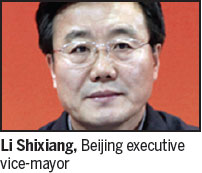

Beijing is determined to keep its population at less than 23 million by 2020 by moving out industries that are not suitable for the capital and adjusting economic structures, deputies said on Friday.
Li Shixiang, executive vice-mayor of Beijing, said during the third session of the 12th National People's Congress that the capital, which faces a serious water shortage, must control its residential population and that the government has taken various measures over the past two years to do so.
After researching the city's water resources capacity, the government found that Beijing's population should be no more than 23 million by 2020, said Li, also an NPC deputy.
"Although the South-to-North Water Diversion Project has reduced the burdens of insufficient water in the city, it has not rooted out the problem," he said. "Water is the key and major reason of the population restriction."
The government has a goal for population control every year in a bid to alleviate the city's living pressures, he said.
By the end of last year, the capital's population had reached 21.52 million, about 6,000 more than the goal the government set for last year, according to Li, who added that the goal for this year is 21.80 million.
To make the capital better play its political role and effectively reduce pressure on the central regions, the government last year transferred almost 50 labor-intensive industries deemed not suitable for the city, such as a wholesale market near the Beijing Zoo, he said.
The government has also planned to move another 36 large markets that are selling clothing and household goods this year, and it will go on working with the city's 16 districts and counties to implement population control this year, according to its government work report, issued in January.

"But moving these industries in fact is not an easy thing, and it's even facing lots of difficulties, which calls for efforts and coordination from Tianjin and Hebei province," Li said.
For example, a website to post information about the wholesale market near the Beijing Zoo has been established for Beijing, but the market's logistics departments are ready to locate in Hebei, "which will bring profits both for the capital and the province."
Yang Xiaochao, a member of the Beijing Municipal Committee, said measures to curb the capital's population growth should also help the integrated economic development of Beijing, Tianjin and Hebei.
"We've enhanced cooperation in different industries since last year. We've done integration in medical and educational fields with Hebei, dispatching our doctors to the provincial hospitals to boost medical quality," Yang said.
caoyin@chinadaily.com.cn